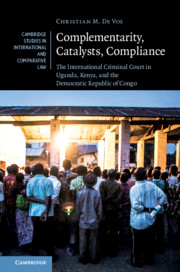 Complementarity, Catalysts, Compliance
Complementarity, Catalysts, Compliance Book contents
- Complementarity, Catalysts, Compliance
- Reviews
- Cambridge Studies in International and Comparative Law: 147
- Complementarity, Catalysts, Compliance
- Copyright page
- Dedication
- Contents
- Acknowledgements
- Table of Cases and Pleadings
- Table of Statutes and Statutory Instruments
- Abbreviations
- Preface
- 1 Introduction
- Part I The ICC and Complementarity: Evolutions, Interpretations and Implementation
- 2 Tracing an Idea, Constructing a Norm
- 3 Mirror Images? Complementarity in the Courtroom
- 4 Leveraging The Hague
- Part II The ICC in Uganda, Kenya and the Democratic Republic of Congo
- Select Bibliography
- Index
- Cambridge Studies in International and Comparative Law: 147
2 - Tracing an Idea, Constructing a Norm
Complementarity as a Catalyst
from Part I - The ICC and Complementarity: Evolutions, Interpretations and Implementation
Published online by Cambridge University Press: 16 April 2020
- Complementarity, Catalysts, Compliance
- Reviews
- Cambridge Studies in International and Comparative Law: 147
- Complementarity, Catalysts, Compliance
- Copyright page
- Dedication
- Contents
- Acknowledgements
- Table of Cases and Pleadings
- Table of Statutes and Statutory Instruments
- Abbreviations
- Preface
- 1 Introduction
- Part I The ICC and Complementarity: Evolutions, Interpretations and Implementation
- 2 Tracing an Idea, Constructing a Norm
- 3 Mirror Images? Complementarity in the Courtroom
- 4 Leveraging The Hague
- Part II The ICC in Uganda, Kenya and the Democratic Republic of Congo
- Select Bibliography
- Index
- Cambridge Studies in International and Comparative Law: 147
Summary
This chapter examines how complementarity has evolved from a legal rule of admissibility - an organizing principle for the regulation of concurrent jurisdiction - to an instrument of policy. This policy, often referred to as ‘positive complementarity’, is one that promotes the International Criminal Court (ICC) and the ‘Rome Statute System’ as proactive agents for domestic accountability. Drawing on constructivist international relations literature, the chapter traces this more ambitious articulation of the ICC’s relationship to national jurisdictions and argues that its ascendance reflects the work of norm entrepreneurs and transnational civil society networks who, through a duty-based reading of the Statute, have progressively sought to articulate a more catalytic vision for the court and, with it, a broad array of policy goals. At the same time, this duty-based interpretation has contributed to an increasingly disciplinary approach to implementation, one that privileges a mirroring of the Rome Statute’s content and the ICC’s form. Complementarity’s evolution is thus testament to the significant influence of non-state actors at both the transnational and local level, and of a growing effort on their part to route the entrenchment of domestic human rights through the framework and standards of international criminal law.
Keywords
- Type
- Chapter
- Information
- Complementarity, Catalysts, ComplianceThe International Criminal Court in Uganda, Kenya, and the Democratic Republic of Congo, pp. 27 - 67Publisher: Cambridge University PressPrint publication year: 2020
